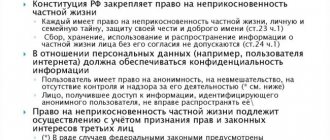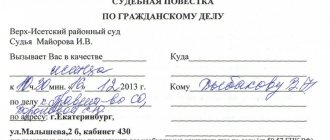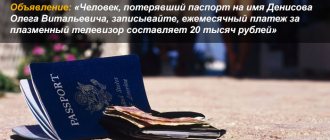1. Restrictions on military service are imposed on convicted military personnel performing military service under a contract for a period of three months to two years in cases provided for by the relevant articles of the Special Part of this Code for committing crimes against military service, as well as convicted military personnel performing military service under contract, instead of corrective work provided for in the relevant articles of the Special Part of this Code. 2. From the monetary allowance of a person sentenced to military service restrictions, deductions are made to the state's income in the amount established by a court verdict, but not more than twenty percent. While serving this sentence, the convicted person cannot be promoted in position or military rank, and the term of punishment is not counted towards the length of service for the assignment of the next military rank.
The right to silence in the law of the Russian Federation
Most people, having legal knowledge at the everyday level, understand the meaning of Art. 51 of the Constitution of the Russian Federation based on films produced in the USA. The phrase “you can remain silent; everything you say can be used..." is familiar to many. In foreign law, this provision is called the “Miranda rule” and implies that any information obtained from detainees before they are (orally) explained the procedural rights cannot be used in court as evidence. Therefore, they try to clarify them immediately.
But in Russia, the “Miranda rule” does not apply, and people who do not answer any questions from law enforcement officials often act to their detriment. They have the right not to report information that will harm them personally or their loved ones, but they cannot remain completely silent.
Commentary to Art. 51 of the Criminal Code of the Russian Federation
Restrictions on military service are assigned only to convicted military personnel performing military service under a contract. Military personnel undergoing military service upon conscription are not subject to restrictions on military service.
Based on the Regulations on the Procedure for Military Service, persons serving under a contract are recognized as citizens of Russia, both men and women, who have entered into a written agreement with the federal executive body on military service for a certain period.
———————————
NW RF. 1999. N 38. Art. 4534; 2000. N 27. Art. 2819.
Restrictions on military service are imposed in the following cases:
1) when the sanction of the article of the Special Part of the Criminal Code of the Russian Federation, which qualifies a crime against military service, provides for punishment in the form of a restriction on military service;
2) when the restriction on military service in accordance with Part 1 of Art. 51 of the Criminal Code of the Russian Federation is assigned instead of correctional labor.
The content of punishment in the form of restrictions on military service and the content of punishment in the form of correctional labor have some common features. However, these are independent types of punishment. The difference between them is that restrictions on military service are assigned for a period of three months to two years, while correctional labor is assigned, we recall, for a period of two months to two years. In addition, the following circumstances are specific to restrictions on military service:
1) continuation of military service by the convicted person at the previous place of service, but on a compulsory basis;
2) withholding to the state income from the monetary allowance of a convicted military man the amounts established by a court verdict, but not exceeding twenty percent. The monetary allowance consists of a monthly salary for the military position held and a monthly salary in accordance with the military rank, as well as other monthly allowances and payments;
3) exclusion of the possibility of promotion in position and military rank. The term of punishment is not counted towards the length of service for the assignment of the next military rank.
Thus, the punitive content of punishment in the form of restrictions on military service consists of: monetary deductions, i.e. limiting the material benefits of the convicted person, prohibiting promotion in position and military rank, which affects the social status of the convicted person and again limits the possibility of obtaining additional material benefits, as well as the prohibition of counting the sentence term towards the length of service for the assignment of the next military rank, which again has an impact impact on the possibility of increasing social status and material income.
Prohibition of self-incrimination
The privilege against self-incrimination is an important component of Art. 51 of the Constitution of the Russian Federation. It is separately prescribed in the main codes - the Code of Criminal Procedure, the Arbitration Procedure Code, the Code of Administrative Offenses and the Code of Civil Procedure of the Russian Federation.
It is worth noting that the prerequisites for witness immunity appeared in England in the 12th century, when those suspected of heresy were forced to take oaths ex officio. In the modern world, this rule is the most important principle of justice. It receives special attention in the USA, Australia, Germany, Canada and the European Union. But the procedural implementation of the privilege against self-incrimination varies depending on the system adopted in the state.
1. In countries of common (case) law, if the suspect agrees to testify, then he is questioned as a witness. Accordingly, he may be held accountable for subsequent refusal to testify or reporting knowingly false information.
2. In the countries of the continental system (including the Russian Federation), a suspect or accused who refuses to testify or gives false information is not held accountable. He is believed to be acting within the framework of the defense against self-incrimination.
The right to refuse testimony is not only related to the story of a specific offense. A person may not provide any information about himself, which may subsequently be used as evidence in criminal proceedings.
A CRIMINAL LAWYER EXPLAINS HOW TO CORRECTLY “TAKE” ARTICLE 51 OF THE RF CONSTITUTION
An experienced lawyer at the stage of preliminary investigation in a criminal case, having started the defense, is obliged to see the prospect of the entire development of the case and from the very first minutes of the investigative actions, of course after lengthy consultations with his client, to develop, as they say, a “reinforced concrete” position, which first of all includes one One of the most important aspects is whether to give or refuse testimony at the preliminary investigation. In other words, the defense lawyer makes a decision for his client whether to use the rules of Article 51 of the Constitution of the Russian Federation or not.
It should immediately be taken into account that not only the possible prospect of termination of the criminal case at the stage of preliminary investigation, which happens extremely rarely, but also a more subjective consideration of the case in court depends on the testimony of the suspect or accused during the investigation. A good and knowledgeable lawyer who has correctly placed all the “I’s” when choosing a position and promptly recommended to his client to “take” Article 51 of the Constitution during the preliminary investigation, in the future will be able to more correctly provide legal assistance to the client and avoid severe punishment than the defendant deserves or convince the court to acquit.
Having worked as a criminal lawyer for a long time, I can say with confidence that the mistake of almost all of my clients, including even former law enforcement officers, is that they all “followed” the investigation and tried to “defend themselves” during the first interrogations, but did not when inviting a defense lawyer, they gave evidence without fully thinking through its meaning. When an already invited lawyer joins the case, there is no difference, by agreement or appointment, it can be extremely difficult to do something “interesting” for the benefit of the already accused with a “mass of correct testimony”, which in most cases does not agree with the evidence of the investigation. It is necessary to remember one “golden” rule: in criminal proceedings, if a suspect or defendant gives some “miscellaneous” testimony at the preliminary investigation, and another in court, and even decides to take Article 51 of the Constitution, then such a “defense” will not work in favor of the defendant . The judge will not accept such testimony, even if you show mastery of oratory in the style of a “seasoned” lawyer, and due to their “secrecy”, simply detachedly, in the end he will give it “to the fullest,” be sure of it. Do not think that the court is a circus performance, and in this institution you can engage in “clownery”; such things do not happen there!
My recommendations, when a client needs to use Article 51 of the Constitution, are always strictly individual in nature. It is possible to choose one or another position in the case only if the defense attorney is fully familiar with those materials of the criminal case, which the defense attorney can familiarize himself with before the first meeting with his client and the client’s revelation with his lawyer. This is a job of complete trust.
A person detained and suspected of a particular criminal offense, regardless of whether he committed it or not, always needs to know, regardless of the circumstances, to invite a lawyer to the first interrogation. Don’t rush to “pour out” your soul to a “good” investigator and answer ill-considered questions. At first glance, a “good” investigator is no different from the “bad” guys of operatives who you think detained you due to a misunderstanding. Testimony can always be resumed in court, and during the investigation you can simply remain silent, let “they” work - they are paid wages, and you have the presumption of innocence and Article 51 of the Constitution and everything is according to the Law. Wait for the lawyer, and only then will you decide how to behave further during the preliminary investigation, give your testimony or hold it until the trial. You are silent, and at the same time your lawyer analyzes the entire criminal case as a whole and slowly “builds” a pyramid of your overall defense picture. Taking the right position during the investigation, bypassing the hidden actions of the investigator and the prosecutor, is not so easy, because they “have in their hands” evidence of your guilt, if any, and which you may not even be aware of. On the other hand, the investigation may have materials from the criminal case that were falsified by operational police officers, and then your incriminating “cards” should be hidden from the investigation until the trial. All the same, investigators and operatives are employees of the same department, and when it comes to protecting the honor of the uniform, in most cases the actions of the investigator who has received materials for initiating a criminal case from the operatives of his Department do not always stand guard over the law and your welfare. This is especially true for cases involving drug trafficking.
If you remain silent during the entire preliminary investigation according to Article 51 of the Constitution, then soon an experienced lawyer, after completing all investigative actions, familiarizing himself with the materials of the entire criminal case before sending the indictment to the prosecutor, will know all the evidence that the investigation has.
In the future, a correctly chosen position during the preliminary investigation and your testimony carefully developed by your lawyer, directly consistent with the evidence of your innocence, a possible alibi that the investigator and prosecutor did not have during the investigation, can be a complete procedural “defeat” of the indictment in court and success, which will be based on the judge’s long-awaited acquittal.
Testimony against spouses and relatives
The list of persons against whom you can refuse to testify is given in paragraph 4 of Art. 5 Code of Criminal Procedure of the Russian Federation. It includes:
- Spouses are persons with whom the marriage is registered in the civil registry office.
- Parents or adoptive parents.
- Children, including adopted children.
- Relatives, including half- and half-brothers, brothers and sisters.
- Grandchildren.
- Grandparents.
The list is closed and applies to all types of production - a similar list is given in other codes of the Russian Federation. The big omission is that it does not include stepfathers, stepmothers, and cohabitants (common-law spouses). In criminal proceedings, witnesses have the right to use clause 3 of Art. 5 of the Code of Criminal Procedure of the Russian Federation on the concept of “close people” (persons who are related, or persons whose well-being is dear to the witness due to personal attachment). Formally, the law indicated by the Constitution of the Russian Federation, Article 51, can also be applied to them.
Guarantees against coercion
The use of actions (threats, blackmail) to force one to testify is a criminal offense under Art. 302 of the Criminal Code of the Russian Federation. It is assumed that any information about the circumstances of a dispute or crime must be given voluntarily, with full understanding of the consequences of what is said. This principle is not formally stated anywhere, but the European Convention implies it at the heart of the very concept of fair justice.
In Russia, it is precisely with guarantees against coercion that the practice of clarifying Art. 51 of the Constitution of the Russian Federation before drawing up all procedural documents within the framework of criminal proceedings and trials.
The Constitution of the Russian Federation (Article 51, the interpretation of which provides for the right to absolute protection from self-incrimination) formally makes it impossible to confess. After all, in essence this is a violation of witness immunity.
For such cases, the Supreme Court of the Russian Federation indicated that the admission of guilt by the accused or suspect is not testimony and does not require the participation of a lawyer. In practice, the investigative authorities, before drawing up the appropriate protocol on confessing something, explain to the person (against signature) the provisions of Art. 51 of the Constitution of the Russian Federation.
What evidence can you avoid giving against yourself, your spouse and close relatives?
To correctly understand your rights, you need to know what kind of testimony you can not give - this is testimony against yourself, your spouse or close relatives.
During the interrogation, the investigator (interrogating officer) and the court are obliged to explain all rights. But, as a rule, everything is limited to just listing them. Unfortunately, if you signed the protocol under the explanation of Art. 51 of the Constitution of the Russian Federation, this will mean that everything is clear to you. In this case, agreeing to testify may lead to a worsening of your position or the position of the person about whom the testimony is given. On the other hand, an unjustified refusal to testify may lead to criminal liability.
Testimony against yourself, a spouse or close relatives is testimony about any circumstances that directly or indirectly concern you and other specified persons. But, as a rule, we are talking about communicating information that could harm a person in some way. For example, create preconditions for suspicion of a crime or other offense, or even worse - become a reason for bringing charges and justifying them. Such evidence must be treated with the utmost care.
Fortunately, Russian criminal law practice is such that the rights provided for in Art. 51 of the Constitution of the Russian Federation are interpreted quite broadly - as the right to silence. But you need to understand that this right still has limitations.
Limitations of witness immunity
It is very important to understand the possible applications of this standard. Article 51 of the Constitution of the Russian Federation is limited to several prohibitions provided for by the current law and law enforcement practice.
- The suspect (accused, witnesses) is obliged to take part in investigative activities that require his activity (confrontation, examination, identification).
- Obtaining, including forced, samples of blood, urine, exhaled air, and voice samples from participants in the process for further use in evidence. The need for these actions is confirmed by the Constitutional Court of the Russian Federation.
- It is possible to interrogate other people about the circumstances and situations that have become known to them from the person who has taken advantage of witness immunity, for the subsequent use of the received information in the evidence base.
- The law of the Russian Federation (Article 1.5 of the Code of Administrative Offenses of the Russian Federation) establishes exceptions to the presumption of innocence. In some cases, a person is obliged to prove his innocence. In European Union countries, this rule applies to car owners who are required to prove their innocence of violating traffic rules.
Right to refuse assistance
Article 51 of the Constitution of the Russian Federation, comments to which are used in law enforcement practice, also implies actions other than refusal to testify. In particular, its content includes the right not to assist in the criminal prosecution process. It includes:
- Refusal to provide any explanation or information.
- Confession (admission of guilt). If a suspect refuses to confess to a crime during the first interrogation, no one has the right to insist on this during subsequent interrogations.
- Failure to hand over things, documents or valuables for investigative actions.
Witness liability
In criminal proceedings, witnesses are invariably warned of the consequences of testifying, as well as the responsibility for lying and misleading the investigation or court.
Perjury as a crime against justice was known back in Ancient Rome. Modern law of the Russian Federation implies the reporting of knowingly false information about facts and circumstances that are known to a witness (expert, specialist) and may affect the results of the investigation or the court decision. Responsibility for it is provided for in Art. 307 of the Criminal Code of the Russian Federation.
The practice of criminal investigation shows that most often cohabitants (common-law spouses), friends, neighbors and acquaintances of victims and accused persons perjure themselves. The reason for their actions is mostly sympathy for possible criminals or their relatives, distrust of the police, but attempts to “settle scores” are also common.
As part of the crime under Art. 307 of the Criminal Code of the Russian Federation, several situations are possible:
1. Conscious delusion, when a witness incorrectly perceives any fact that affects the results of the investigation.
2. Using lies as a means of defense against suspicion. It is common for witnesses to retract information or even their own testimony in order to avoid being charged with a crime. But here, too, Article 51 of the Constitution of the Russian Federation can be applied. Exempt use cases:
- The witness claims that he did not buy drugs from the accused, because in this case he actually admits to a crime under Art. 228 of the Criminal Code of the Russian Federation. His deliberate lie does not entail liability, since he protects himself from slander.
- The witness provides false information because he believes that otherwise he himself will become a suspect in the crime.
If a person tries to avoid confessing to a criminal offense by lying, then liability under Art. 307 of the Criminal Code of the Russian Federation does not apply to him, because the Constitution of the Russian Federation (Article 51) protects against self-incrimination. But the situation is completely different if they perjure themselves for the sake of public opinion. People often try to appear more conscientious, law-abiding, or considerate than they actually are.
3. A deliberately false denunciation (report of a crime) is often used to divert suspicion. Responsibility for this crime is provided for in Art. 306 of the Criminal Code of the Russian Federation.
The quality and results of justice directly depend on people fulfilling their civic duty. However, the warning about liability for perjury is still perceived by many as an empty formality. Therefore, the level of crimes under Art. 306-307 of the Criminal Code of the Russian Federation remains high.
Other types of witness immunity
The Constitution of the Russian Federation (Article 51, Part 2) provides for cases of exemption from testifying, depending on the status of the witness and the circumstances that he must explain. This list includes:
- Judges or jurors - about the facts that became known to them as part of the consideration of a specific criminal case.
- Lawyers and defenders - information that became known to them in the process of providing legal services. Valid for criminal and civil proceedings.
- Clergy (Christianity, Buddhism, Islam) cannot disclose information received from parishioners during the confession process. At the same time, representatives of sects and creeds do not have the right to use this type of immunity.
- Deputies of representative bodies at the federal and regional levels have the right to refuse to testify about circumstances that became known to them during the exercise of their powers.
- Diplomats (all those endowed with this status, including technical workers) - about any circumstances and facts. But immunity ceases to apply if consent to interrogation is obtained from a foreign state.
There are certain gaps in this list. For example, legal assistants, translators and representatives of citizens who are not their relatives do not have immunity. All of them can be questioned without the right of refusal.
The Constitution of the Russian Federation, Article 51 is a very important norm for domestic legislation and a country that has experienced a time of mass repression. She is a guarantor of respect for human and civil rights during communication with law enforcement and judicial authorities.
Persons who can take advantage of witness immunity according to the Code of Criminal Procedure of the Russian Federation
The Code of Criminal Procedure of the Russian Federation in the relevant articles directly indicates those persons who have the right or obligation to refuse to testify. In addition, the limits of witness immunity are established:
- the circle of persons in respect of whom there is a right or obligation not to testify;
- a range of circumstances (issues) regarding which a person has the right or obligation not to testify.
Yes, in addition to the right to witness immunity, in some cases there is a duty to refuse to testify. Therefore, situations of witness immunity are conditionally divided into two corresponding groups. The consequences of testifying in each of these two cases are completely different.
The following have the right to refuse to testify due to the presence of a certain procedural status:
- Witnesses.
- Victims.
- Civil plaintiffs and defendants.
- Suspects, accused, defendants.
- Representatives of the above persons.
These persons may not testify in relation to themselves, their spouse and close relatives.
The following have the right to refuse to testify due to their professional status:
- Persons who have diplomatic immunity - until they obtain consent to interrogation from the foreign state in whose service the person is (was) or the international organization of which the person is (was) a member.
- Senators of the Federation Council and deputies of the State Duma of the Russian Federation - only in part of the circumstances that became known to them in connection with the exercise of their powers.
Cannot be questioned (must refuse to testify):
- Jurors and judges - only in part of the circumstances of the criminal case that became known to them in connection with their participation in the proceedings in this case.
- The arbitrator - only in part of the circumstances that became known to him within the framework of the arbitration proceedings (arbitration).
- Lawyers and defenders of a suspect (accused) in a criminal case - only in part of the circumstances that became known to them in connection with the requested or provided legal assistance. The obligation does not apply if the lawyer (defender) himself requests the interrogation, the interrogation has been agreed upon with the client and it will be in his interests.
- Priests - only in part of the circumstances that became known to them from confession.
- Officials of the Federal Tax Service of the Russian Federation - only in part of the circumstances that became known to them in connection with the information provided in the special declaration under the law on “capital amnesty” (N 140-FZ of 06/08/2015).
The above persons cannot be questioned as witnesses and only for those circumstances to which immunity applies. If they are summoned for questioning, they must refuse to testify in this part, but in other circumstances they are required to testify. At the same time, these persons are also subject to the right provided for in Part 1 of Art. 51 of the Constitution of the Russian Federation. That is, they may not testify against themselves, their spouse and close relatives on a general basis.
In addition to the above, there are restrictions on the interrogation of sick people who, by forensic examination, are recognized as incapable, due to their mental or physical condition, of correctly understanding the circumstances of a criminal case and testifying on them. There is no direct prohibition on interrogation of such persons in the Code of Criminal Procedure of the Russian Federation, but their testimony will not be valid and must be recognized as inadmissible evidence. These persons, personally or through their representatives, have the right to refuse to testify without the occurrence of legal consequences of such refusal.






